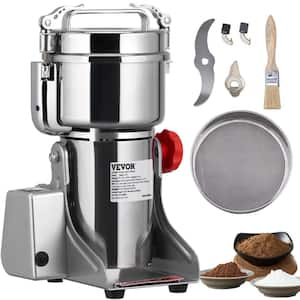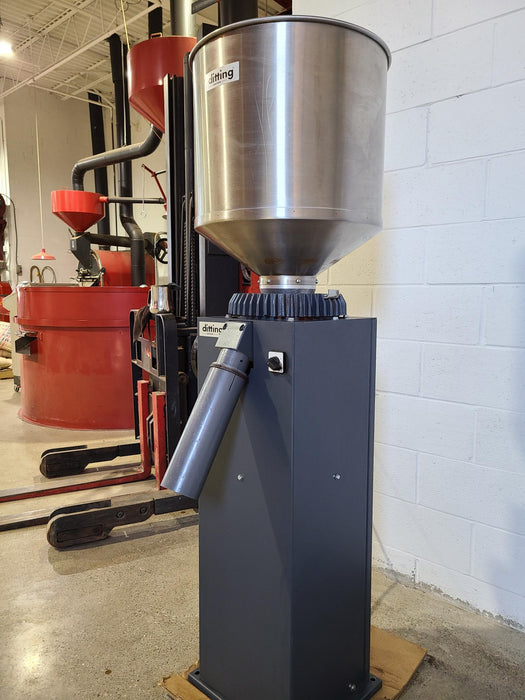Discover the Top Industrial Coffee Grinder for Business Needs
Discover the Top Industrial Coffee Grinder for Business Needs
Blog Article
Exactly How to Pick the Perfect Industrial Coffee Grinder for Your Business
Choosing the perfect commercial coffee mill for your business is a diverse decision that calls for mindful factor to consider of several vital aspects. It is necessary to review your certain grinding needs, consisting of the volume of coffee refined and the desired work consistency, as these components straight affect taste and client contentment. In addition, recognizing the different kinds of mills readily available can considerably influence your operational performance. As you browse these factors to consider, one need to additionally consider the ramifications of spending plan and upkeep. What various other elements could make or damage your choice?
Assess Your Grinding Needs
When choosing an industrial coffee mill, one must first assess their grinding needs to make certain ideal efficiency and consistency. This first assessment entails comprehending the quantity of coffee to be refined daily, as well as the wanted grind dimension for different brewing methods. A high-capacity grinder may be required for companies offering big amounts of coffee, while smaller procedures might discover an extra small model enough.
Moreover, it is important to take into consideration the kinds of coffee beans being made use of, as various beans may call for details grinding techniques to achieve the most effective taste profile. Oily beans may demand a grinder created to manage such qualities without clumping or overheating.
Another essential variable is the called for work uniformity. Specialty coffee services commonly require exact work dimensions to improve removal and flavor, making it vital to pick a mill that can supply consistent outcomes. Ultimately, examining the available area and electric needs will certainly assist in selecting a mill that fits perfectly into your functional operations. By extensively analyzing these elements, services can make informed choices that straighten with their coffee grinding demands, inevitably resulting in a premium item and satisfied clients.
Understand Mill Types
Understanding the various types of industrial coffee grinders is essential for making an informed selection that satisfies particular functional demands. There are largely 2 categories of mills: blade grinders and burr grinders.
Blade grinders utilize rotating blades to chop the coffee beans, causing an inconsistent work dimension - Industrial Coffee Grinder. While they might be a lot more cost effective, they are usually not appropriate for commercial applications where precision is essential
On the other hand, burr mills provide a more uniform work by squashing the beans in between 2 surface areas. They can be further classified right into level burr and cone-shaped burr mills. Flat burr mills supply a consistent work dimension and are generally preferred for coffee preparation, while cone-shaped burr grinders are flexible and can deal with a series of brew methods, from coffee to French press.
When selecting a grinder, consider the details requirements of your company, consisting of desired grind uniformity, production quantity, and the kinds of coffee beverages you plan to supply - Industrial Coffee Grinder. Each mill type has its advantages and restrictions, so comprehending these nuances allows informed decision-making that aligns with functional objectives
Evaluate Grind Size Uniformity
Accomplishing grind dimension uniformity is necessary for generating premium coffee, as variations in fragment dimension can substantially affect removal and flavor. When picking a commercial coffee grinder, it is crucial to evaluate exactly how well the maker keeps harmony in work size throughout different batches. Irregular work sizes can result in unequal extraction, causing a mug that might taste extremely bitter or weak.
To examine grind dimension uniformity, take into consideration grinders with attributes such as adjustable work setups and premium burrs. Burr grinders, in particular, master generating uniform particle sizes compared to blade mills. The product and form of the burrs play an essential function, with stainless-steel and ceramic options offering toughness and precision.

Consider Manufacturing Capacity
In the busy world of coffee production, considering production capability is vital for businesses intending to fulfill demand without giving up quality. The manufacturing ability of an industrial coffee grinder directly affects a business's ability to accomplish orders efficiently, take care of stock, and react to varying market fads.
When evaluating manufacturing ability, it is important to assess the grinder's outcome price, normally determined in extra pounds per hour. This dimension ought to straighten with your organization's projected sales volume and growth targets. A coffee shop with a high turnover might need a grinder that can refine several hundred pounds daily, while a smaller sized procedure could be enough with a reduced capability model.
Furthermore, consider the sort of coffee being refined. Various beans and blends might influence grinding speed and performance, requiring visit the site a grinder efficient in handling varied production demands. It's also worth factoring in the grinder's capacity to keep consistent high quality under high outcome problems, as any type of fluctuations can affect the end product.
Ultimately, picking a mill that matches your service's production capacity will certainly guarantee you stay affordable and responsive to consumer assumptions.

Budget Plan and Upkeep Variables
When examining the right commercial coffee mill, upkeep and spending plan aspects play a considerable duty in the overall decision-making procedure. A first investment in a premium mill can produce long-lasting benefits, but it's necessary to establish a clear budget that straightens with your service's functional demands. Think about both the purchase price and potential functional costs, such as energy usage and replacement components.
Maintenance is an additional vital facet that can affect your spending plan. Industrial coffee grinders call for routine maintenance to ensure ideal efficiency and durability. Examine the producer's referrals for maintenance, consisting of cleansing timetables and parts substitute, as these will impact lasting operational costs. Furthermore, take into consideration his comment is here the schedule of solution and assistance, as dependable support can reduce downtime and repair service costs.

Buying a grinder that is sturdy yet very easy to maintain can conserve money gradually. While lower-priced alternatives might be alluring, they might sustain higher upkeep costs and decreased effectiveness. Eventually, balancing initial costs with long-term upkeep and operational performance will lead you to the most effective choice for your organization's coffee grinding needs.
Conclusion
Picking the ideal commercial coffee grinder requires a complete examination of grinding needs, grinder types, grind size uniformity, production capacity, and budgetary factors to consider. By focusing on these variables, services can make certain the acquisition of a reputable, effective mill that meets details operational demands. A well-chosen grinder not just improves the top quality of the coffee generated yet additionally adds to the total success and earnings of the venture. Lasting efficiency and maintenance convenience ought to stay central to the decision-making process.
Specialty coffee organizations often demand exact work sizes to enhance extraction and taste, making it vital to choose a mill that can deliver consistent results. Flat burr grinders use a constant work size and are typically favored for espresso prep work, while conelike burr mills are functional and can manage a variety of brew approaches, from espresso to French press.
When choosing an industrial coffee grinder, it is vital to review just how well the maker maintains harmony in grind size across different batches. Burr grinders, in particular, excel in producing uniform particle dimensions compared to blade mills.Picking the optimal commercial coffee grinder requires an extensive evaluation of grinding demands, grinder kinds, grind dimension consistency, manufacturing capacity, and budgetary factors to consider.
Report this page